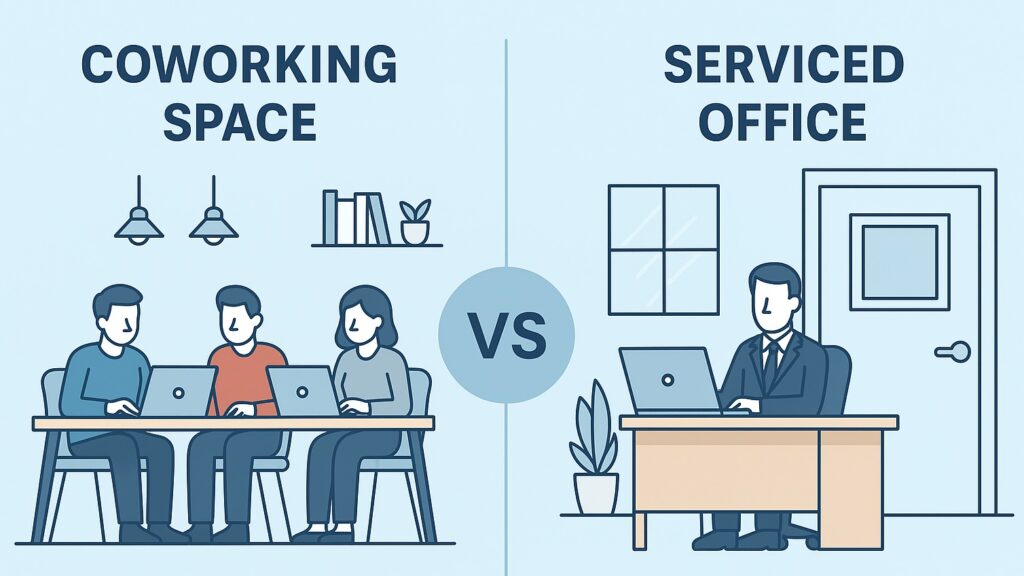Flexibility: Coworking vs Serviced Offices
Published: 24th July 2025
In today’s rapidly evolving business landscape, the concept of a fixed, traditional office space feels increasingly rigid. As someone who helps businesses navigate the vibrant world of flexible workspaces, I’ve come to appreciate that the true value of modern offices often lies in their agility. This brings us to a crucial comparison that many businesses ponder: the level of **Flexibility: Coworking vs Serviced Offices**. Understanding how each of these popular options handles adaptability, scalability, and contract terms isn’t just about convenience; it’s about building a resilient and responsive business model. Let’s delve into the nuances of flexibility offered by these two distinct workspace solutions across the UK.
The Modern Imperative: Why Flexibility Matters More Than Ever
The past few years have taught us invaluable lessons about the importance of being adaptable. Unexpected market shifts, rapid growth spurts, or even unforeseen challenges can dramatically alter a business’s spatial needs. The ability to pivot quickly, without being shackled by long-term leases or hefty break clauses, is no longer a luxury – it’s a necessity. This is where flexible offices truly shine, offering a stark contrast to the rigidity of conventional property leases.
I’ve personally witnessed the profound relief on a business owner’s face when they realise they don’t have to commit to five years or more. That sensation of freedom, of knowing they can adjust their footprint as their business breathes, is a powerful emotional advantage that goes beyond mere financial benefits.
Coworking Spaces: Ultimate Agility for Individuals and Small Teams
Unpacking the Flexibility Offered by Coworking
Coworking spaces are the epitome of on-demand working. Their very design is built around providing maximum **flexibility: Coworking vs Serviced Offices** often highlights the former’s lighter touch and lower commitment. They cater to a diverse range of users, from solo entrepreneurs to small project teams, offering various membership models that prioritise spontaneity and short-term needs.
- Membership Types:
- Day Passes: The ultimate in flexibility. Pay for a hot desk or a private day office only when you need it. Perfect for occasional use, travelling professionals, or those escaping home distractions for a day.
- Part-Time/Flexi Memberships: Often granting access for a set number of days per month (e.g., 5, 10, or 15 days). This suits hybrid workers or businesses with varying weekly needs.
- Unlimited Hot Desk Memberships: Providing full access to shared workspaces, usually on a rolling monthly contract. This offers consistent access without a dedicated spot.
- Contract Lengths:
Typically, coworking contracts are incredibly short-term. Day passes are single-use, while most monthly memberships are on a rolling basis, requiring only a month’s notice to terminate or adjust. This makes them ideal for:
- Individuals unsure of their long-term office needs.
- Startups with unpredictable growth patterns.
- Remote workers who need occasional physical space.
- Project teams with definite end dates.
- Scalability:
Scaling up or down in a coworking environment is relatively seamless. Need an extra hot desk for a week? Just buy a day pass. Your team grows from 2 to 4 people? Simply upgrade your membership to include more users or opt for a small private office within the same space if available. This ability to instantly adapt your workspace size to current demands is a cornerstone of coworking’s appeal.
The beauty of coworking’s flexibility lies in its simplicity. You’re buying access and community, not a physical space tied to a lengthy agreement. It empowers individuals and small teams to adapt without financial penalty or complex negotiations.
Serviced Offices: Flexible Control with a Professional Edge
Understanding the Adaptability of Serviced Office Solutions
When comparing **Flexibility: Coworking vs Serviced Offices**, it’s essential to recognise that serviced offices offer a different, yet equally valuable, form of flexibility. While they provide a dedicated private space, their terms are far more adaptable than traditional leases, coupled with a comprehensive service offering. They are designed for businesses that need a consistent, professional base but still value the agility to grow, shrink, or relocate efficiently.
- Contract Lengths & Terms:
Unlike conventional leases that can bind you for 3, 5, or even 10 years, serviced office agreements (often called licences or agreements) are typically much shorter:
- Short-term Agreements: Commonly ranging from 3 to 12 months, though some providers offer 1-month rolling contracts. This provides significant freedom compared to traditional leasing.
- Notice Periods: Generally, notice periods are much shorter – often just one to three months. This makes exiting or adjusting your space far less punitive.
- All-Inclusive Pricing: The flexibility extends to your budget. A single monthly fee covers rent, business rates, utilities, cleaning, maintenance, internet, and often reception services. This financial predictability is a huge relief for budgeting and avoids hidden costs.
- Scalability Within the Centre:
This is a key strength of serviced offices. If your team expands or contracts, the provider can often move you to a larger or smaller office within the same building or portfolio, often with minimal fuss and a simple adjustment to your agreement. I’ve seen businesses triple their team size without ever having to physically relocate outside their established office centre, maintaining their prestigious address and continuity.
- Agility in Location:
Many large serviced office operators have networks of centres across cities and even countries. This allows businesses to easily relocate to a different area or establish satellite offices without the extensive search and setup time associated with traditional real estate.
The flexibility of serviced offices is about empowering businesses with stability and control over their physical footprint, allowing them to focus on growth without being tied down by property management complexities. It’s a sophisticated form of adaptability.
Flexibility in Practice: Real-World Scenarios
Let’s consider how **Flexibility: Coworking vs Serviced Offices** plays out in practical business situations:
- The Rapidly Growing Startup:
Coworking: Can start with a few hot desks, then move into a small private office within the same space. Very low commitment, good for initial testing. However, rapid growth might mean outgrowing the specific coworking space’s private office options quickly, necessitating a full move.
Serviced Office: Starts with a small private office (e.g., for 4-6 people). As the team grows, they can seamlessly move into a larger suite within the same building when it becomes available, preserving their address and operational flow. This offers a more controlled and professional scaling path.
- The Project-Based Team:
Coworking: Ideal for very short-term projects (weeks to a few months) where hot desks or day offices suffice. Budget-friendly for irregular use.
Serviced Office: Perfect for projects lasting several months to a year or more. Provides a dedicated, private, and fully equipped space for the team, with clear start and end dates and predictable costs.
- The Established Business Launching a New Venture:
Coworking: Can be used as a testbed, with team members dipping in and out as needed, assessing the viability of a new product or market.
Serviced Office: Offers a more robust, professional base for a new venture, allowing for a strong initial presence and smooth operations, while still maintaining shorter, flexible terms compared to setting up a traditional branch office.
The key takeaway is that both offer superior flexibility compared to traditional leases, but the *type* of flexibility differs. Coworking excels in ultimate individual freedom and ultra-short commitments, while serviced offices provide robust, managed private space with excellent scalability and predictable terms for businesses requiring a dedicated base.
Seeking Your Perfect Flexible Workspace?
Understanding the nuances of **Flexibility: Coworking vs Serviced Offices** is crucial for making the right choice. Our impartial experts are ready to help you navigate the options, ensuring you find a workspace that perfectly matches your business’s dynamic needs and growth ambitions across the UK.
Find Your Flexible Office SolutionWhich Type of Flexibility Suits Your Business?
The decision isn’t about which is inherently “more flexible,” but rather which *type* of flexibility aligns with your operational reality and future aspirations. I often advise clients to consider these factors:
- Frequency of Office Use: Occasional or daily?
- Team Size and Growth Plans: Are you a solo operator, a small team, or a rapidly expanding SME?
- Need for Privacy and Dedicated Space: Is a private office essential for your work and client interactions?
- Budget Predictability: Do you need fixed, all-inclusive costs for easy budgeting?
- Administrative Burden Tolerance: How much time and resource can you dedicate to office management?
- Brand Image: What kind of impression do you want to make on clients and partners?
For those who value ultra-low commitment, spontaneous access, and a strong community vibe for individual or very small team use, coworking’s flexibility is hard to beat. For businesses needing a consistent, professional, managed private office that can adapt with their growth, with predictable costs and minimal administrative burden, serviced offices offer superior flexibility. The market for flexible workspace is rich with options, and understanding the differences in **Flexibility: Coworking vs Serviced Offices** is the first step to making an informed decision.
Explore Diverse Flexible Office Options in the UK!
From buzzing London hubs to serene regional centres, our extensive network of properties offers a spectrum of flexible workspaces. Dive into our listings and find the perfect match for your business’s unique flexibility requirements.
Browse Flexible Offices Across the UK

